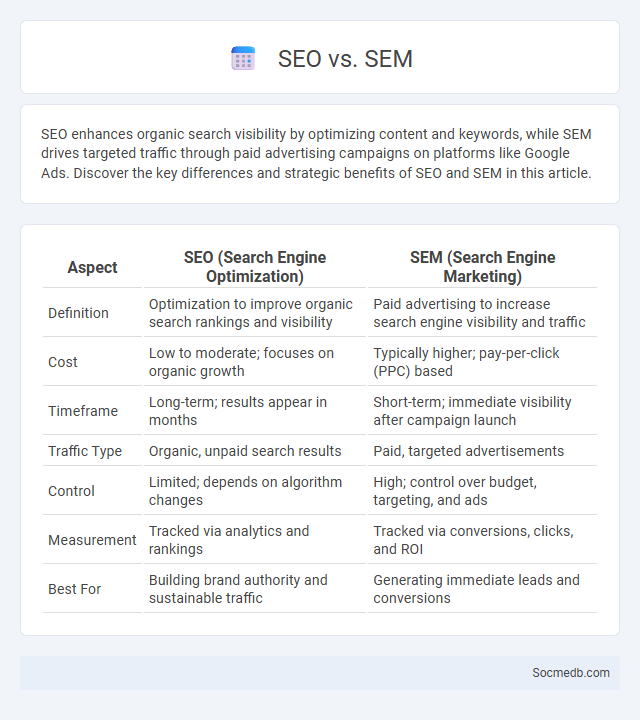
Photo illustration: SEO vs SEM
SEO enhances organic search visibility by optimizing content and keywords, while SEM drives targeted traffic through paid advertising campaigns on platforms like Google Ads. Discover the key differences and strategic benefits of SEO and SEM in this article.
Table of Comparison
| Aspect | SEO (Search Engine Optimization) | SEM (Search Engine Marketing) |
|---|---|---|
| Definition | Optimization to improve organic search rankings and visibility | Paid advertising to increase search engine visibility and traffic |
| Cost | Low to moderate; focuses on organic growth | Typically higher; pay-per-click (PPC) based |
| Timeframe | Long-term; results appear in months | Short-term; immediate visibility after campaign launch |
| Traffic Type | Organic, unpaid search results | Paid, targeted advertisements |
| Control | Limited; depends on algorithm changes | High; control over budget, targeting, and ads |
| Measurement | Tracked via analytics and rankings | Tracked via conversions, clicks, and ROI |
| Best For | Building brand authority and sustainable traffic | Generating immediate leads and conversions |
Understanding SEO: Definition and Key Concepts
SEO, or Search Engine Optimization, involves optimizing your social media content to increase visibility and drive organic traffic from search engines. Key concepts include keyword research, on-page optimization, link building, and content quality, all aimed at improving your content's ranking on search engine results pages (SERPs). Understanding SEO empowers you to strategically enhance your social media presence and attract your target audience effectively.
What is SEM? Essential Elements and Benefits
SEM, or Search Engine Marketing, involves promoting your website through paid advertisements on search engines like Google to increase visibility and drive targeted traffic. Essential elements include keyword research, ad creation, bidding strategies, and performance tracking to optimize campaign effectiveness. You benefit from immediate search result presence, enhanced brand awareness, and measurable ROI through precise audience targeting.
SEO vs SEM: Core Differences Explained
SEO (Search Engine Optimization) improves organic search rankings by optimizing website content, keywords, and user experience to increase visibility on platforms like Google. SEM (Search Engine Marketing) involves paid advertising campaigns such as PPC (Pay-Per-Click) ads to drive immediate traffic and target specific audiences on search engines. While SEO provides long-term growth through sustained organic traffic, SEM delivers faster results but requires continuous investment to maintain ad placement and visibility.
Why Skills Assessment Matters in Digital Marketing
Skills assessment in digital marketing identifies proficiency in SEO, content creation, and social media management, ensuring campaigns are executed effectively. Accurate evaluation of digital marketing skills helps businesses optimize ad spend and improve return on investment. Assessments also highlight knowledge gaps, enabling targeted training that boosts overall team performance and drives revenue growth.
Key Skills Needed for Effective SEO
Effective SEO for social media requires proficiency in keyword research to target relevant and high-traffic terms that align with Your brand's audience. Mastery of content optimization, including crafting engaging posts with appropriate meta tags and hashtags, enhances visibility across search engines and social platforms. Analytical skills to monitor performance metrics and adapt strategies ensure sustained growth and improved search rankings.
Essential Skills for Successful SEM Campaigns
Optimizing social media SEM campaigns requires expertise in keyword research, audience targeting, and ad copywriting to increase click-through rates and conversions. Proficiency in analytics tools like Google Analytics and Facebook Ads Manager enables accurate performance tracking and data-driven adjustments. Mastery of budget management and A/B testing ensures efficient allocation of resources and continuous campaign optimization.
How to Assess SEO and SEM Skills in Candidates
Assessing SEO and SEM skills in candidates requires evaluating their ability to conduct keyword research, optimize website content, and manage paid advertising campaigns effectively. You should review real case studies or portfolios demonstrating measurable improvements in search engine rankings, traffic growth, and return on ad spend (ROAS). Conducting scenario-based interviews and practical tests on tools like Google Analytics, Google Ads, and SEO platforms ensures candidates possess both theoretical knowledge and hands-on expertise.
Tools for Evaluating Digital Marketing Competencies
Social media analytics platforms such as Hootsuite, Sprout Social, and Google Analytics provide essential tools for evaluating digital marketing competencies by tracking engagement, reach, and conversion rates. These tools enable you to measure campaign effectiveness, identify audience behavior patterns, and optimize content strategies based on data-driven insights. Leveraging social media dashboards and performance reports ensures your marketing efforts align with business goals and continuously improve.
Integrating Skills Assessment into Your Marketing Strategy
Integrating skills assessment into your marketing strategy enhances audience targeting and content relevance by identifying key competencies within your team and customer base. Leveraging data from skill evaluations allows for tailored campaigns that address specific needs and improve engagement metrics. This approach positions your brand as both knowledgeable and customer-centric, driving measurable ROI and sustained growth.
Conclusion: Aligning SEO, SEM, and Skills Assessment for Growth
Aligning SEO, SEM, and skills assessment creates a strategic foundation for maximizing social media growth by enhancing visibility and engagement. Leveraging targeted keywords and paid search campaigns amplifies reach while evaluating skills ensures the team adapts to evolving digital trends. This integrated approach drives sustained traffic, improves conversion rates, and fosters continuous improvement in social media marketing.
 socmedb.com
socmedb.com